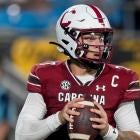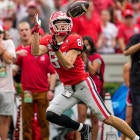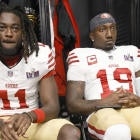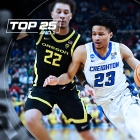Attorneys who are trying to get preliminary approval of the NCAA’s $75 million concussion settlement are pushing back against an objection by a former San Diego State football player.
In a Chicago federal court filing Friday, attorneys for the Adrian Arrington plaintiffs said the objection is filled with untrue facts, such as that the deal forces athletes impacted by head injuries to forfeit billions of dollars. Last month, attorney Jay Edelson objected to the settlement on behalf of former San Diego State player Anthony Nichols, arguing the deal doesn’t cover medical costs for former college athletes as the suit originally intended.
Arrington attorneys Steve Berman and Joe Siprut wrote Friday that the “centerpiece” of Nichols’ opposition is the “unfounded” fact that the settlement allows the NCAA to avoid billions of dollars of liability and that no lawyer would take an $8,000 to $20,000 concussion case on individual damages. “Such declarations sound awful, and were they even remotely true we should be terminated as Lead Counsel,” Berman and Siprut wrote.
Under terms of the settlement, the NCAA would create a $70 million fund to test thousands of current and former athletes for brain trauma and put aside $5 million for research. The settlement would cover only diagnostic medical expenses, not actual treatment -- a criticism by some opponents of the deal. Athletes would preserve their rights to individually sue universities, conferences or the NCAA for personal-injury damages and waive their claims collectively.
There are 73 plaintiffs among the consolidated lawsuits attached to Arrington, a former Eastern Illinois football player who sued the NCAA in 2011. Only 10 of those 73 plaintiffs have asserted personal injury claims against the NCAA and “just one — Nichols — is contesting the class waiver,” the Arrington plaintiffs wrote.
Replied Edelson in a phone interview: “There’s no need for more (objections). This isn’t a numbers game. If it got preliminary approval, then you’ll see hundreds of objections. It’s not a vote right now. Our view is the settlement isn’t even close and we think it’s going to be thrown out.”
Edelson has claimed that only about 3,500 of the 4.2 million class members are expected to receive medical monitoring tests over the 50-year span of the program. He states those tests will deliver to the class a total of “perhaps $140,000 actual value.”
The Arrington plaintiffs countered that Nichols’ case might be worth just $8,000 to $20,000 because he is currently asymptomatic. There are currently 19 personal-injury claims of any kind pending against the NCAA, with 18 of those cases being individually litigated, the Arrington plaintiffs wrote.
“Only Nichols is seeking to proceed by way of a class action,” the Arrington plaintiffs wrote. “The record suggests that he is doing so because his individual claim is low value at best. He is currently asymptomatic and is outside the statue of limitations. … The simple fact is the value of Nichols’ individual claim is too low to proceed individually.”
The Arrington plaintiffs said there is no medically accurate way to know which members of the at-risk population will face concussion-related disorders. “So, when Nichols laments that just 3,500 will have a Medical Evaluation, he is lamenting that more Settlement Class Members will not develop functionally life-ending diseases,” the Arrington plaintiffs wrote. “Such discontent is at odds with the Class’ interests.”
The Arrington plaintiffs said Nichols’ argument is “baseless” that the medical monitoring program is worth $140,000. Based on a participation rate of 25 percent, there could be 8,814 people who will receive testing with an economic value up to $54 million, the Arrington plaintiffs claimed.
The Arrington plaintiffs said Nichols concedes that a personal-injury class may not be certified on all issues yet “these are the actual weaknesses Class Counsel considered” when seeking to certify a 50-state class and given that liability certification objections “are routinely overruled.” Edelson, the Nichols attorney, is operating with “blinders on and “looking for a pulpit, not a courtroom,” the Arrington plaintiffs wrote.
“Because Mr. Edelson claimed to seek access to the Arrington discovery, Class Counsel arranged to copy 68 disks and two hard drives for him,” the Arrington filing said. “Yet, Mr. Edelson has never paid for nor picked up the discovery. Actions speak louder than words.”
When asked if he has received discovery from Arrington’s lawyers, Edelson responded, “That’s all just silly. They want to make this about me. We have a large team who is working on this. … We’ve gotten a lot of discovery. The discovery, that’s all a red herring. That’s not the issue. Ninety-five percent of personal injury claims will never be brought.”
The Arrington plaintiffs fired back at Nichols’ characterization in court filings that “89 percent” of the settlement class members get nothing from the deal. Players would have to fill out screening questionnaires to determine if they should be evaluated.
Just because an asymptomatic class member doesn’t qualify for a medical evaluation doesn’t mean he or she did not receive a benefit, the Arrington plaintiffs claim. Rather, they said, the class member will obtain “valuable medical insight” into their current cognitive condition and can track their health against symptoms that may develop in the future. Players can take the questionnaire up to five times over a 50-year period.
According to the latest Arrington filing, the NCAA tracked that from 2002 to September 2013, 44 of the 97 lawsuits filed against the NCAA were brought by college athletes. Just 11 of those lawsuits by athletes alleged personal injury or negligence.
The breakdown of NCAA lawsuits brought by athletes: 21 eligibility claims, nine antitrust claims, seven negligence, four personal injury/negligence, one breach of contract, one defamation, and one drug testing. The NCAA reported that just three of the negligence lawsuits focused on traumatic brain injuries: the Arrington, Chris Walker and Derek Sheely cases.
In trying to show that personal injury claims can be valuable, the Arrington plaintiffs cited the NFL monetary award grid for settling individual claims. The average base award for symptomatic NFL players is $1.37 million, according to the Arrington plaintiffs. "They can't get their story straight on whether personal injury claims are valuable," Edelson said.
Friday’s filing states that Arrington, the former football player, had incurred medical expenses of at least $76,568 as of April 29, 2013, plus $19,023 in costs as a result of his scholarship being revoked. “Mr. Arrington would hardly agree that his costs plus continued symptoms, including seizures, amount to a personal injury claim that is worthless,” his lawyers wrote.




















